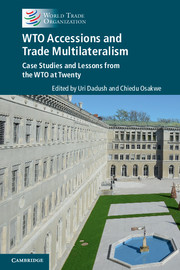Book contents
- Frontmatter
- Dedication
- Contents
- List of contributors
- Foreword
- Acknowledgements
- List of abbreviations
- Editors' note
- PART I WTO accessions, the trading system and the global economy
- PART II Overview: systemic outcomes from accessions
- PART III Members’ perspectives on accession negotiations
- PART IV Working party chairpersons’ perspectives on accession negotiations
- PART V Salient features inWTOAccession Protocols
- PART VI Conclusion
- 41 Accession Protocols as building blocks
- Annex: Contributor biographies
- Index
- Plate section
41 - Accession Protocols as building blocks
from PART VI - Conclusion
Published online by Cambridge University Press: 05 November 2015
- Frontmatter
- Dedication
- Contents
- List of contributors
- Foreword
- Acknowledgements
- List of abbreviations
- Editors' note
- PART I WTO accessions, the trading system and the global economy
- PART II Overview: systemic outcomes from accessions
- PART III Members’ perspectives on accession negotiations
- PART IV Working party chairpersons’ perspectives on accession negotiations
- PART V Salient features inWTOAccession Protocols
- PART VI Conclusion
- 41 Accession Protocols as building blocks
- Annex: Contributor biographies
- Index
- Plate section
Summary
This book provides multiple perspectives on the process and results from WTO accession negotiations. The perspectives reflected are those of economists, lawyers, academics, chief negotiators of selected original WTO members and Article XII members, chairpersons of WTO accession working parties, professionals from the multilateral institutions of the WTO, World Bank, International Monetary Fund and International Trade Centre. Analysis is combined with ‘stories’, enriched by anecdotes. The detailing of the facts of trade policy drudgery is accompanied by explanatory narratives that bring the situations to life. In many ways, what will strike the reader is that this is a unique book of high value that has emerged from a system that has yielded higher levels of transparency, albeit grudgingly and only when pressed.
At the outset, three key questions were established for the preparation of this book. First, how does the complex and unique process of WTO accession negotiations work, and can it be improved? Second, after two decades, what are the principal results from thirty-three completed WTO accessions, and what have been the systemic effects? Third, do the results, in process and substance, provide lessons for broader trade negotiations, such as in launched multilateral trade rounds, or in other variable configurations, such as in preferential trade agreements, regional trade agreements and the so-called mega-regionals? In addition to these core questions, the multiple perspectives in this book reveal a raft of other questions that authors have asked. For instance, some have asked whether there are indeed rules that govern accession negotiations. This question has been associated with questions about the fairness of the terms and conditions of non-original, i.e. Article XII, members. There have been questions regarding how members and acceding governments engage and behave. In all, the core questions and the subset of questions have a logical relationship.
One question that virtually runs through all the chapters is why countries and/or separate customs territories want to accede. What is the rationale for countries and/or separate customs territories that overrides the tedium and misery of accession negotiations that, on average, take ten years to complete? Thirty-three have been completed. Twenty-two have accession working parties, established by the WTO General Council, at various levels of activity. Other countries, that currently have no WTO status, have signalled that they intend to apply. There is a spectrum of reasons, from the strategic, to the tactical, encompassing general and particular factors.
- Type
- Chapter
- Information
- WTO Accessions and Trade MultilateralismCase Studies and Lessons from the WTO at Twenty, pp. 909 - 916Publisher: Cambridge University PressPrint publication year: 2015



